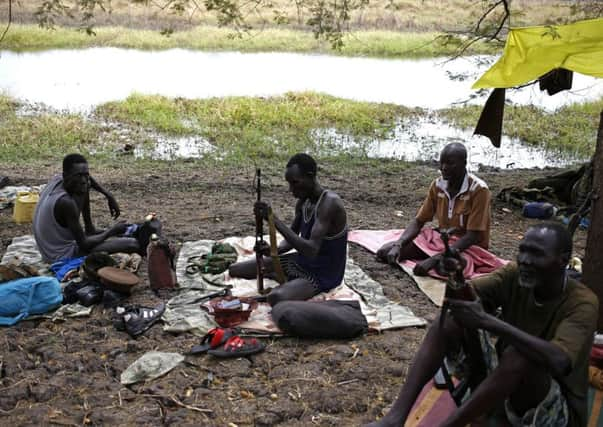Team arrives in South Sudan to monitor ceasefire


The warring sides signed the ceasefire on 23 January to end weeks of fighting, but sporadic clashes have continued, underlining the challenge regional mediators face when peace talks resume in neighbouring Ethiopia this week.
Diplomats expect the monitors will focus on the three flashpoint towns of Malakal and Bentiu, near the country’s main oilfields, Bor, where some of the heaviest clashes have occurred, and the capital Juba.
Advertisement
Hide AdAdvertisement
Hide Ad“We will start our mission, at least the teams will be deployed, within the next week,” General Gebreegzabher Mebrahtu, a retired Ethiopian general who is leading the advance team, told reporters in Juba.
The team’s first task was to meet government officials and non-state organisations and conduct reconnaissance of possible areas for deployment, the regional Intergovernmental Authority on Development grouping, which brokered the truce, said in a statement.
Thousands of people have been killed and more than 800,000 have fled their homes since fighting erupted in mid-December, triggered by a power struggle between president Salva Kiir and his former deputy Riek Machar whom he sacked in July.
The conflict, which has taken on a largely ethnic dimension between the Dinka (Mr Kiir) and Nuer (Machar) tribes, has brought oil-producing South Sudan to the brink of civil war.
On Friday, rebel leader Mr Machar accused Mr Kiir of sabotaging the peace talks and waging a campaign of ethnic cleansing, in an interview he gave to an international news agency at his bush hideout in remote Jonglei state.
Mr Machar blamed the army for the continued violence. He said the government wanted to extend its control outside Malakal, Bentiu and Bor, all of which fell under rebel control before government forces recaptured them.
The violence, the worst since South Sudan won independence from Sudan in 2011, has triggered a humanitarian crisis.
At least 3.2 million people – more than a quarter of the population – face food shortages, the United Nations says, while aid agencies warn that insecurity is hampering their operations.
Advertisement
Hide AdAdvertisement
Hide AdThe medical charity Medecins Sans Frontieres said on Friday that 240 of its staff had left for the bush to escape fighting in Unity state.
Sudan’s government has suspended the activities of the International Committee of the Red Cross in the country, the organisation said yesterday without giving details of the reasons.
Meanwhile, the US envoy to South Sudan urged to start political reforms, saying the issues that led to armed conflict must be resolved so the world’s newest country can achieve lasting peace.
South Sudan needs to “establish frameworks and principles for creating more democratic institutions,” Donald Booth said in the Ethiopian capital of Addis Ababa, where 34 African leaders attended an African Union summit.
South Sudan’s constitution gives the president extensive powers, and Mr Kiir has been accused by his main political rival of governing like a dictator. Last year, amid a power struggle within the ruling party, Mr Kiir sacked his deputy, the entire cabinet, as well as the ruling party’s secretary-general – dismissals that escalated tensions in a country with a history of divided military loyalties.
More than 700,000 people have been displaced by violence since mid December when the loyalties of presidential guards splintered and they fought along ethnic lines in the capital, Juba.
Accused of plotting a failed coup, former Mr Machar went into hiding and declared himself the leader of renegade troops seeking to topple Kiir’s government.
The United Nations said both sides have committed gross violations of human rights during the conflict, in which entire army battalions defected to the rebels made up of mainly Nuer fighters loyal to Machar.